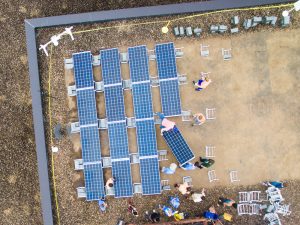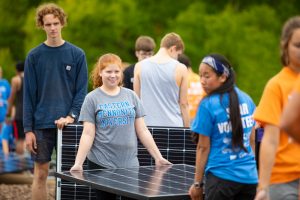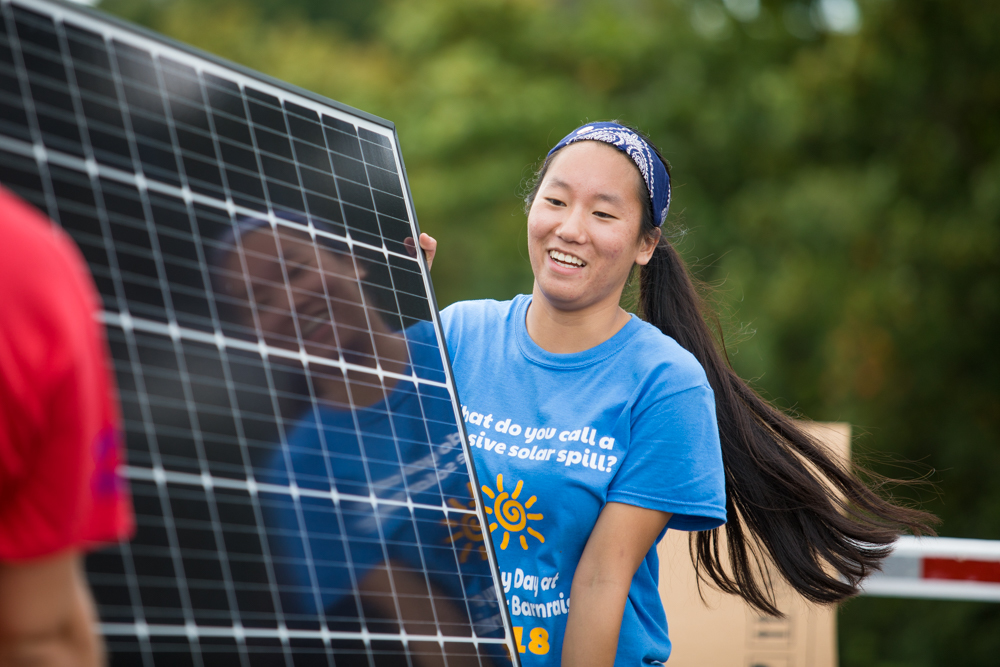A year-long student-initiated effort at Eastern Mennonite University became a physical reality in a matter of days last week and will increase the university’s solar energy capacity by 65 percent.
Dubbed a “solar barn raising” by organizers, the event enlisted about 70 students and volunteers to install 120 solar panels on the University Commons roof plus 66 panels atop Roselawn. Their combined 65.2 kilowatts are in addition to the 104.3-kilowatt solar array installed on the roof of EMU’s Sadie Hartzler Library in 2010.
The new solar arrays are expected to be in full operation by mid-October.
“It’s a way to leave our mark on campus while also making it more sustainable,” said Miriam Beck, co-leader of the student group Earthkeepers, which did fundraising and coordinated volunteers for the project. “We’re just here for a few years, but this project is going to be here for a long time. Students care a lot about sustainability.”
With support from Secure Futures Solar, guidance from Green Hill Solar and Beck Builders of Virginia, and electrical work by Mid Valley Electric, students assembled and placed mounting brackets to which the panels were then attached. The arrays are primarily ballasted – held in place with concrete block weights – which does not require penetration of roof surfaces.

The installation required removing old gravel ballast from the rooftops, which students worked on for several days leading up to the Saturday “barn raising.”
“I have classes in Roselawn, and we’ve been hearing all of the grating, moving noises,” said junior Clara Weybright, president of EMU’s Sustainable Food Initiative club and all smiles Saturday morning. “This is really great.”
Ruth Reimer-Berg, also a junior, carried concrete blocks for the installation across the University Commons roof.
“I’m really excited, because sustainability is really important,” she said. And the grueling work? “It’s something that we can take with us. When we go out into the world, we can find these sort of projects and help out. We’ve already done it once, so we can do it again.”
Earthkeepers co-leader Andy King had compiled a music playlist for the day of songs such as Queen’s signature “We Are the Champions of the World.”

“This was sort of a grassroots movement led by the students, so if you want something done on campus, just work together and talk to your administration to get things finished,” he said. “It’s really empowering for the students.”
All told, the project budget was approximately $120,000. Student-led crowdfunding brought in more than $13,000 last year – funds that were matched by two donors – and Siemens contributed $15,000 to the the project as a sustainability education contribution. Secure Futures, which owns the arrays in a customer self-generation agreement, also provided additional funding, including $5,000 from a 2016 U.S. Department of Energy Sunshot grant awarded Secure Futures and Mennonite Central Committee (MCC). That grant for nonprofits also helped fund “solar barn raisings” at Gift and Thrift in Harrisonburg, the MCC Material Resource Center in Ephrata, Pennsylvania, and Daniels Run Peace Church in Fairfax, Virginia.
A current student-led crowdfunding campaign, inspired by the solar project, is seeking $8,000 for an off-grid, sustainable concession stand at EMU’s turf field and illustrates the ongoing passion for sustainability on campus, said Braydon Hoover, director of development and annual giving.
Secure Futures technical manager Andrew Yoder, a 2016 alumnus now enrolled in EMU’s MBA program, said the barn raising concept and use of volunteers isn’t something that can happen everywhere.
“It’s a community of people who are committed to the same goal,” he said. “It’s something pretty unique about the Mennonite community that’s able to come together – and EMU provides a great structure for that.”

These types of projects make me proud to work at EMU!
Hey dear, I am lucky that I contributed for Southwest Solar Barn Raising. The Southwest Solar Barn Raising Program was designed to provide renewable solar energy for low-income families to offset rising utility costs while helping to reduce greenhouse gas emissions in southwest Colorado.
Indeed sustainability is important! Solar energy does not only offer sustainability but also clean power, that’s why I’m such a big supporter of this. Love to hear news like this, where people come together especially students contributing to the betterment of our environment. All schools should look into integrating solar system.